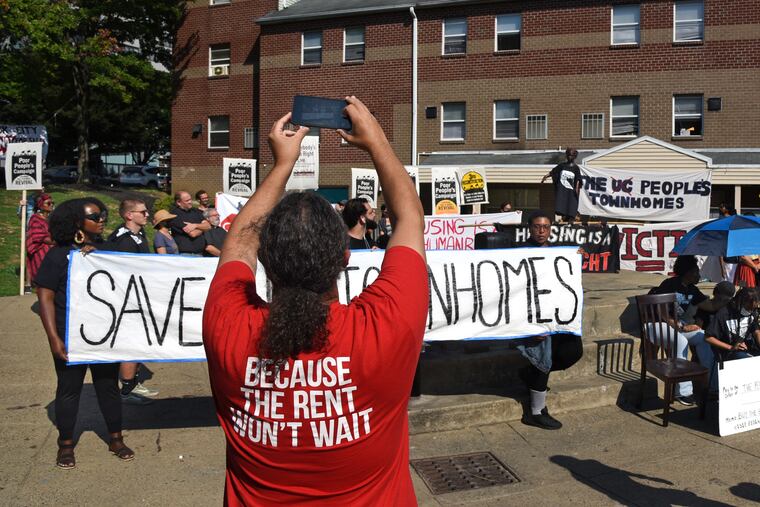Amid Philly’s crisis of affordable housing, a ‘perfect storm’ is brewing
Two factors — aging housing stock and the impending expiration of thousands of affordable housing contracts — have already begun to converge in our city.

The affordable housing crisis in Philadelphia is facing a perfect storm that threatens to make things even worse for people looking to find a safe place to call home.
Two harsh realities — the failure to maintain an aging housing stock and the impending expiration of thousands of affordable housing contracts — have already begun to converge in our city.
The dire situation at the University City Townhomes is the latest example of how these forces have come together in Philadelphia. The outrage that we all witnessed there was also present in the encampments on the Benjamin Franklin Parkway and right next door to our offices here at the Philadelphia Housing Authority. But make no mistake: The affordable housing emergency that we’re facing did not start with these events, and it did not end once the city’s collective attention turned to other matters.
Quite frankly, the problem is only escalating. Because of expiring affordable housing contracts with private owners, the city estimates that there are 14,500 households that could face the same fate as the residents of the University City Townhomes over the next decade. As those contracts come to an end, the owners can exercise their right to opt out of continuing to provide affordable housing, and many are doing just that: turning once-affordable units into market-rate developments — which could mean another 14,500 families facing eviction.
» READ MORE: Why the University City Townhomes are really vanishing — and why it could happen again
Then there are the more than 60,000 households in Philadelphia who must wait years for a housing voucher or for a spot in public housing — and that figure represents only a fraction of the real need. The National Low Income Housing Coalition cites the need for more than 260,000 affordable rental homes for households earning less than 30% of the area median income in Pennsylvania alone and a staggering seven million homes nationwide.
Let us not forget that rapidly rising inflation and the looming potential for an economic recession will make the problem much worse, especially for low-income residents.
As the largest affordable housing provider in the city, we at PHA are taking the lead on trying to address each of these factors. But activists, developers, nonprofits, our agency, and the city need to work together on a multitude of fronts. When officials in Houston moved 25,000 people who were living on the streets into homes, they did it through collaboration: More than 100 agencies in the city — homeless advocates, churches, food banks, the housing authority, and many others — joined a collective effort that has resulted in a sharp turnaround.
Here at PHA, we are working with the Preservation Network — a collection of more than 40 community partners — to preserve the city’s existing affordable housing stock. The collaboration has included working with the city to establish a “Housing Accelerator Fund” to finance the acquisition and rehabilitation of affordable housing and to provide working capital when feasible.
» READ MORE: How thousands of affordable homes in Philly are threatened by expiring government subsidies
PHA is also focused on programs like the U.S. Department of Housing and Urban Development’s Rental Assistance Demonstration program and housing choice vouchers. Through those efforts and federal housing tax credits, our agency has generated over 7,000 housing opportunities and leveraged over $1.36 billion in private and public funding over the last decade.
We have also instituted a program that provides bonuses to landlords who agree to rent to residents who have housing choice vouchers, as residents with vouchers can find it difficult to get landlords to accept vouchers and rent to them. Through a community outreach initiative, our agency has brought more than 500 new landlords into the program during the last year.
While I am proud of these developments, enormous challenges lie ahead, and so much more work is needed. For example, public policy decision-makers must ensure that, where public funds are used to subsidize affordable housing developments, the government has a fundamental right of first refusal should a developer decide to “opt out” of long-term subsidy contracts, as with the University City Townhomes. With this in place, the city could purchase affordable housing stock from developers and save it from getting replaced by market-rate developments.
The time is now to be intentional and coordinate housing strategies across multiple levels, while also promoting the value of public-private partnerships so we can tackle the housing crisis head-on and successfully weather the storm to come.
Kelvin A. Jeremiah is the president and CEO of the Philadelphia Housing Authority.